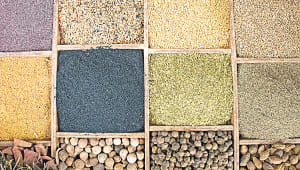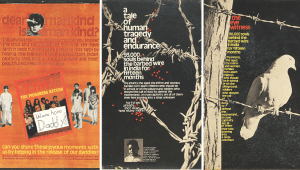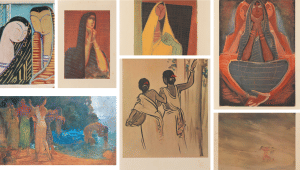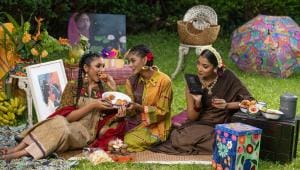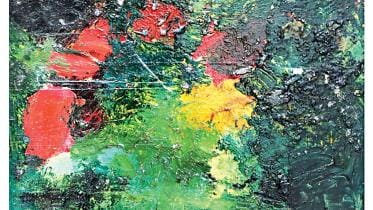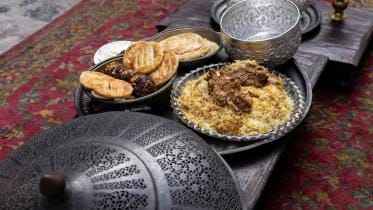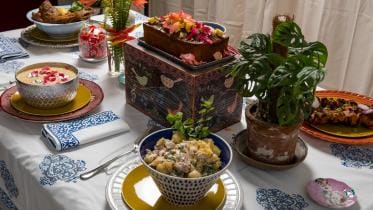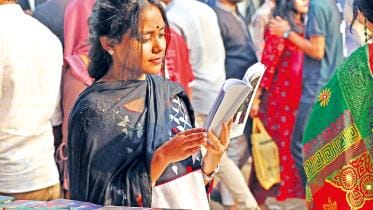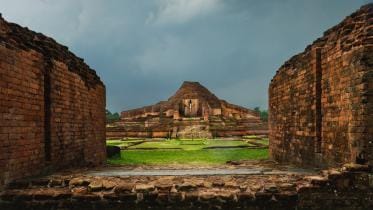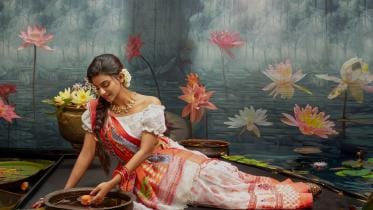An ode to Murtaja Baseer and his lifelong passions
As a painter, he was larger than life. Baseer entered art school not out of a passion for the creative field, but he was on a mission, a role he undertook as a sign of political allegiance to the leftist movement.
22 August 2025, 18:49 PM
When art walks among us: A collaboration between Manas and Bipasha Hayat
It is not often that fashion designers collaborate with artists to create wearable art, but when Faiza Ahmed, of Manas fame, worked with Bipasha Hayat, something magical came into being.
10 August 2025, 11:28 AM
Remembering 36th July!
The year 2024 shall forever remain etched in our hearts as a season of mixed emotions. On one hand, we look back at those tumultuous days with joy. On the other hand, we remain apprehensive about what lies ahead.
5 August 2025, 04:10 AM
Embracing the chaos: The art of creation
Creative blocks mirror nature’s barren phases, yet chaos and stillness birth inspiration. True creativity resists control, flowing from instinct and emotion. In its wild, sacred moments, we connect deeply—with self, soul, and the art of becoming.
24 May 2025, 10:47 AM
A wall’s eye-view diary of a neighbourhood
Every locality in this city has stories, and none seem to speak louder than the anecdotes shared by walls! Case in point: Shantinagar! Having lived here for over four decades, I am no stranger to the tales they offer, and curiously, these narratives are ever-changing.
23 May 2025, 18:53 PM
Old Dhaka Weddings: Of flavours and traditions
In Old Dhaka, kachchi biriyani has emerged as the quintessential wedding dish
29 April 2025, 09:15 AM
Shakrain: Kites and tastes of Old Dhaka
Shakrain is now observed by the entire community of Old Dhaka
28 April 2025, 08:23 AM
Rashid Choudhury: Weaving magic into Bangladesh’s art scene
Rashid Choudhury revolutionized Bangladeshi art by pioneering modern tapestry, blending Bengal’s cultural heritage with European techniques. His vibrant, symbolic works redefined artistic boundaries, inspiring generations and transforming textile art into a powerful medium of national identity.
13 April 2025, 15:03 PM
An Eid lunch to remember
Kumkum Rahman grew up in Dhaka. As part of the generation of the ’70s, she has recollections of a relatively quaint city, free from the hustle and bustle of the present day. Among her most treasured memories are those of Ramadan in the metropolis, but what remains etched in her heart is the joy of Eid in a bygone era.
29 March 2025, 10:45 AM
Abahani vs. Mohammedan: The football rivalry that defined a generation
Back in the day, the Abahani-Mohammedan rivalry was as fierce as Real Madrid-Barcelona
25 March 2025, 15:44 PM
Why I will always love the month of Ramadan
Ramadan holds a special place in the heart, rooted in childhood memories of fasting, reading, and spending time with family. The sacred month provides a chance for reflection, reconnecting with loved ones, and appreciating life's simple, meaningful moments.
27 February 2025, 10:13 AM
The art, identity, and culture behind book covers
It is much more than just a protective wrapper. A book cover creates the first impression a writer wishes to convey to readers. Since the dawn of printing, books have been a testament to the technological developments of the time, and a reflection of the culture and art of the region.
20 February 2025, 18:00 PM
“Story of Art” brings Bangladesh’s artistic legacy to life
Dhaka Storytellers fosters creativity through curated exhibitions, such as the “Story of Art” showcasing Bangladesh’s diverse art scene. Proceeds support rural education, intertwining art with philanthropy, while celebrating prominent artists and inspiring young creatives.
16 February 2025, 07:59 AM
Missed moments? Post-wedding photoshoots to the rescue!
A post-wedding photoshoot captures intimate, stress-free moments after the wedding. It offers creative freedom, eliminates time pressure, and helps couples reconnect. Preserve love, emotions, and new memories beyond the big day with unique, personalized photography experiences.
2 February 2025, 08:28 AM
Is it time to re-think New Year celebrations?
In Dhaka, New Year celebrations face criticism for firework-related hazards, noise pollution, and harm to pets. This begs the question; is it time to re-think New Year celebrations?
2 January 2025, 14:40 PM
Empty nest? More like an empty heart: How one family turned loneliness into love
A woman facing an empty nest found renewed purpose by taking in her house-help's daughter. Despite restrictive adoption laws in Bangladesh, her family secured guardianship, focusing on emotional support and building a fulfilling bond.
28 October 2024, 10:40 AM
Think you've seen it all? Wait till you visit this 8th-century gem in Bangladesh
Somapura Mahavihara — “the Great Monastery situated in the locality of the moon” — is one of the oldest monuments in the country, and a UNESCO heritage site. Located to the northwest of Bangladesh in the district of Naogaon, the ruins of the Buddhist vihara at Paharpur serves as a cue to what was once a flourishing Buddhist culture.
17 October 2024, 07:59 AM
A postcard from memory lane: Revisiting Dhaka’s GPO
My earliest recollections of the city’s General Post Office are linked to my late grandmother.
8 October 2024, 18:00 PM
Unveiling the goddess within
Durga Puja celebrates Goddess Durga, highlighting her strength, courage, and compassion. These divine traits are present in every woman, empowering them to face challenges and embrace their inner goddess during the festival and beyond.
30 September 2024, 09:14 AM
Sharat’s graceful homage
Fall brings a whole new meaning to Bengali fashion. In this day and age, we love taking cues from global trends and fusing them with our versatile styles the rest of the year, but come this season we still lean towards more traditional forms and hues.
26 September 2024, 09:30 AM



